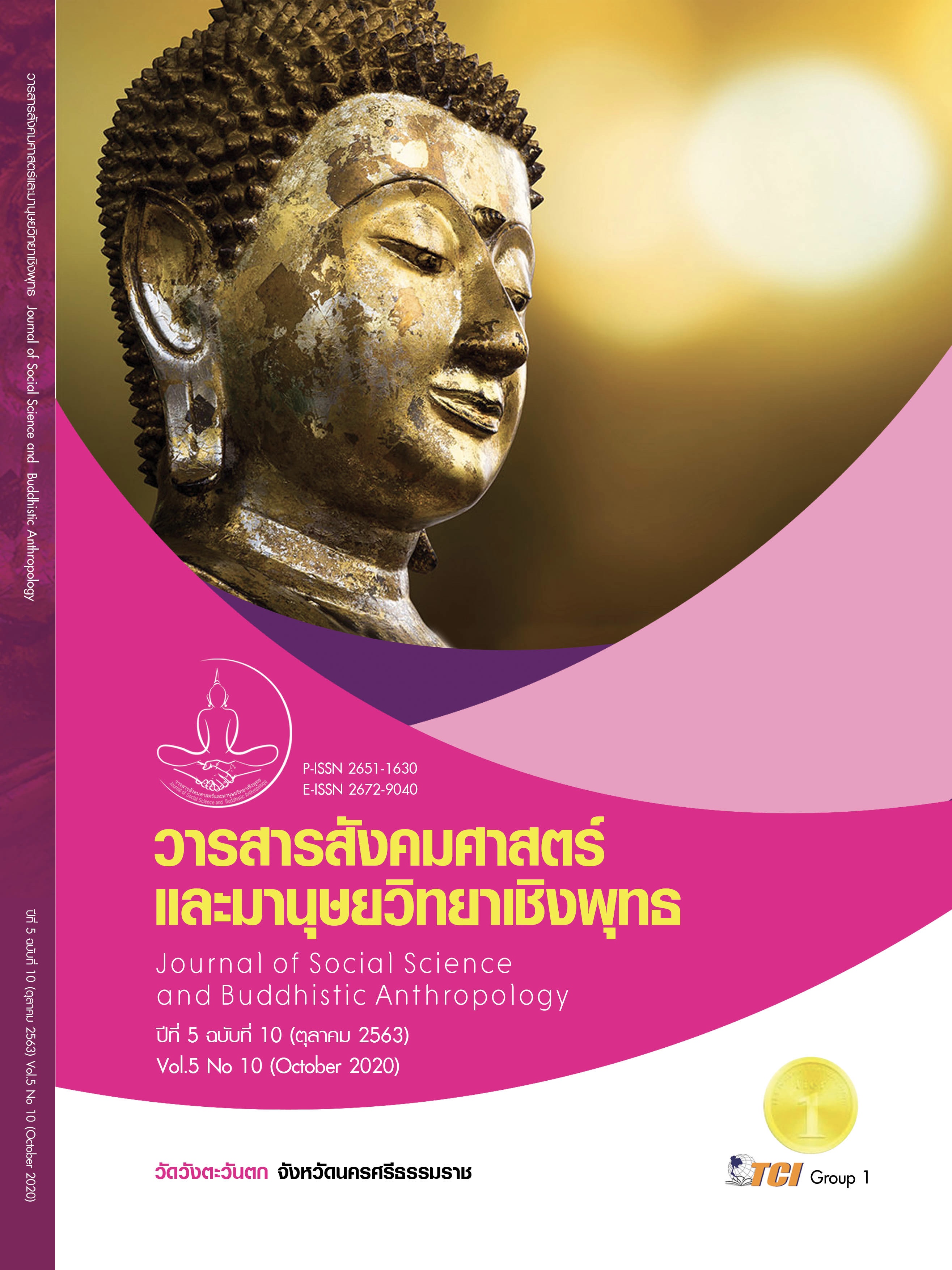MORALITY AND ETHICS DEVELOPMENT MODEL FOR STUDENTS IN SCHOOLS UNDER KAMPHAENG PHET EDUCATIONAL SERVICE AREA OFFICE
Keywords:
Development Model, Problem, Moral and Ethics, Student in School Under Kamphaeng Phet Educational Service Area OfficeAbstract
The Objectives of this research article were to: 1) Study the conditions, problems and factors related to moral and ethics development of students in school. 2) Develop moral and ethics development model of students in school. 3) Experiment and evaluation of the experiment using the moral and ethics development of students in school. This research uses the Mixed Methods Research. The tools used in the research were questionnaires. The sample consisted of school administrators and the teachers were the data providers of 353 people. The data analyzed by frequency, average, percentage, and standard deviation. The results of research were found as follows: 1) the conditions, problems and factors related to moral and ethics development of students in school found that the school has planning, appoint a committee, define operational procedures, meetings, and analyze information that is essential to operational planning. 2) Develop moral and ethics development model of students in school have 6 components which are 1) Principles of moral and ethics development model for students in school 2) Objectives moral and ethics development model for students in school 3) Curriculum of moral and ethics development model for students in school 4) Process of moral and ethics development model for students in school 5) Products and 6) Conditions of success. 3) The results of the develop moral and ethics development model of students in school found that 1) personnel have awareness and understanding in moral and ethics development. 2) Personnel can design activities for develop moral and ethics development model. 3) Students have knowledge and understanding about moral and ethics development. 4) Students practice moral and ethics development activities. 5) Students are satisfied with the moral and ethical development. 6) Activities that develop moral and ethics of students at a high level 7) Students have moral, ethics and desirable values 8) Confederate are satisfied with the moral and ethics development model of student's at a high level.
References
กระทรวงศึกษาธิการ. (2551). หลักสูตรแกนกลางการศึกษาขั้นพื้นฐานพุทธศักราช 2551. กรุงเทพมหานคร: กระทรวงศึกษาธิการ.
เขมณัฏฐ์ หล่อศรีศุภชัย. (2557). การพัฒนาหลักสูตรฝึกอบรมเพื่อพัฒนาคุณธรรมและจริยธรรมด้านจิตสาธารณะของนักศึกษามัธยมศึกษาตอนปลายสถานศึกษา สังกัดสำนักงานส่งเสริมการศึกษานอกระบบและการศึกษาตามอัธยาศัย. ใน ดุษฎีนิพนธ์การศึกษาดุษฎีบัณฑิต สาขาวิชาการบริหารการศึกษา. มหาวิทยาลัยราชภัฏบ้านสมเด็จเจ้าพระยา.
ฉลองชัย อินทขีณี. (2557). รูปแบบการพัฒนาจริยธรรมด้านการมีวินัยของนักเรียน โรงเรียนมัธยมศึกษา ในจังหวัดหนองคาย. ใน ดุษฎีนิพนธ์ปรัชญาดุษฎีบัณฑิต สาขาวิชายุทธศาสตร์การพัฒนาภูมิภาค. มหาวิทยาลัยราชภัฎมหาสารคาม.
ฐิตาภา เบ็ญจาธิกุล. (2557). รูปแบบการพัฒนาคุณธรรมจริยธรรมของผู้บริหารสถานศึกษา สังกัดสำนักงานคณะกรรมการการศึกษาขั้นพื้นฐาน. ใน ดุษฎีนิพนธ์ปรัชญาดุษฎีบัณฑิต สาขาวิชาการบริหารการศึกษา. มหาวิทยาลัยนอร์ทกรุงเทพ.
ทองพูล ภูสิม และคณะ. (2554). การพัฒนาคุณธรรมจริยธรรมและคุณลักษณะอันพึงประสงค์ 8 ประการ ตามหลักสูตรแกนกลางการศึกษาขั้นพื้นฐาน พ.ศ. 2551 กรณีศึกษาโรงเรียนแกดำวิทยาคาร สำนักงานเขตพื้นที่การศึกษามหาสารคาม เขต 1. ใน วิทยานิพนธ์ครุศาสตรมหาบัณฑิต สาขาวิชาการบริหารการศึกษา . มหาวิทยาลัยราชภัฏมหาสารคาม.
ประไพรัตน์ ลำใจ. (2557). รูปแบบการพัฒนาคุณธรรม จริยธรรมระดับมัธยมศึกษา. ใน ดุษฎีนิพนธ์การศึกษาดุษฎีบัณฑิต สาขาวิชาการบริหารการศึกษา. มหาวิทยาลัยพะเยา.
พรนิภา จันทร์น้อย. (2560). รูปแบบกิจกรรมการพัฒนาพฤติกรรมทางจริยธรรมของนักศึกษา ในสถาบันอุดมศึกษาเอกชนตามคุณลักษณะบัณฑิตอุดมคติไทย. ใน ดุษฎีนิพนธ์ปรัชญาดุษฎีบัณฑิต สาขาวิชาผู้นำทางการศึกษาและการพัฒนาทรัพยากรมนุษย์. มหาวิทยาลัยเชียงใหม่.
พระครูประทีปธรรมนาถ (ชุตินฺธโร). (2555). การจัดกิจกรรมส่งเสริมคุณธรรม และจริยธรรมของนักเรียน. ใน วิทยานิพนธ์พุทธศาสตรมหาบัณฑิต สาขาการบริหารการศึกษา. มหาวิทยาลัยมหาจุฬาลงกรณราชวิทยาลัย.
ภักดี เอื้อราษฎร์. (2554). การเสริมสร้างคุณธรรม จริยธรรมตามแนวปรัชญาของเศรษฐกิจพอเพียงของนักเรียน: การวิจัยปฏิบัติการแบบมีส่วนร่วม กรณีโรงเรียนผดุงนารี สังกัดสำนักงานเขตพื้นที่การศึกษามัธยมศึกษา เขต 26. ใน ดุษฎีนิพนธ์ครุศาสตรดุษฎีบัณฑิต สาขาบริหารการศึกษา. มหาวิทยาลัยราชภัฎมหาสารคาม.
สมคิด บางโม. (2554). องค์กรและการจัดการ. (พิมพ์ครั้งที่ 5). กรุงเทพมหานคร: วิทยพัฒน์.
สรวิชญ์ เรือนแก้ว. (2559). กลยุทธ์การบริหารการจัดการศึกษากึ่งสงเคราะห์ของสถานศึกษาขั้นพื้นฐาน ในจังหวัดตาก. ใน ดุษฎีนิพนธ์ปรัชญาดุษฎีบัณฑิต สาขาวิชายุทธศาสตร์การบริหารและการพัฒนา. มหาวิทยาลัยราชภัฎกำแพงเพชร.
สำนักงานเขตพื้นที่การศึกษาประถมศึกษากำแพงเพชร เขต 1. (2557). รายงานข้อมูล. เรียกใช้เมื่อ 10 มิถุนายน 2557 จาก http://www.kpt1.go.th/main/
สำนักงานคณะกรรมการการศึกษาขั้นพื้นฐาน. (2550). นโยบาย สพฐ. ปี 2551. กรุงเทพมหานคร: โรงพิมพ์สหกรณ์การเกษตรแห่งประเทศไทย จำกัด.
สำนักงานคณะกรรมการพัฒนาการเศรษฐกิจและสังคมแห่งชาติ. (2560). แผนพัฒนาเศรษฐกิจและสังคมแห่งชาติ ฉบับที่ 12 (พ.ศ. 2560 - 2564). กรุงเทพมหานคร: สำนักงานคณะกรรมการพัฒนาเศรษฐกิจและสังคมแห่งชาติ สำนักนายกรัฐมนตรี.
สำนักวิชาการและมาตรฐานการศึกษา. (2560). แนวทางการพัฒนาและประเมินค่านิยมหลักของคนไทย 12 ประการ. กรุงเทพมหานคร: สำนักงานคณะกรรมการการศึกษาขั้นพื้นฐาน.
อุดม ลีลา. (2561). กลยุทธ์การพัฒนาจริยธรรมนักเรียนในสถานศึกษาขั้นพื้นฐาน สังกัดสำนักงานเขตพื้นที่การศึกษาประถมศึกษากำแพงเพชร เขต 1 และ 2. ใน ดุษฎีนิพนธ์ปรัชญาดุษฎีบัณฑิต สาขาวิชาการบริหารการศึกษา. มหาวิทยาลัยราชภัฎกำแพงเพชร.
Cronbach, L. J. (1990). Essentials of psychological testing (5th ed.). New York: Harper Collins. Publishers.
Krejcie, R. V. & Morgan, D. W. (1970). Determining Sample Size for Research Activities. Educational and Psychological Measurement, 30(3), 607-610.









